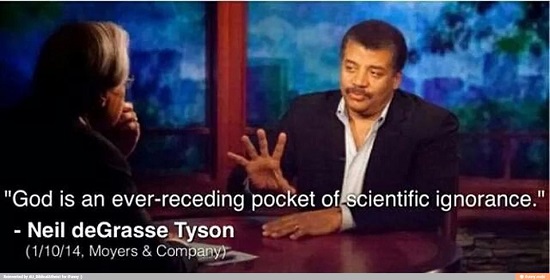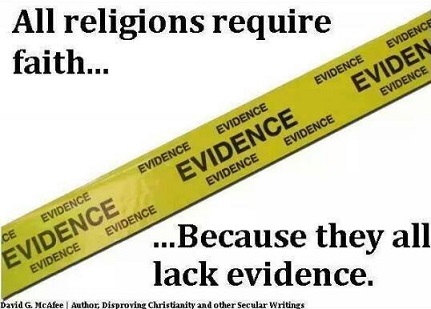
Understanding Atheism (for Christians)
My hope with this article is to be able to give Christians a better understanding of Atheism and how Atheists debate and reason, in the hope that it will promote maturity and tolerance on both sides and help to avoid countless hours of wasteful misunderstanding, by clarifying some of the basic principles from where Atheists derive their arguments.
(Disclaimer: I do not claim to speak for all Atheists. There are over 40,000 different Christian denominations in the world today. Atheism, by contrast, consists of only a handful of variants, but is also found in countless levels of intensity. I consider myself to be an approachable, open-minded, level headed Atheist, the kind I would like to divulge about here).Â
Atheists Are Not Angry With God
Contrary to popular belief, Atheists don’t harbor any animosity towards God. It’s actually quite difficult to hate something you don’t even believe exists. If you are a Christian reading this, think about Santa Clause for a moment… Now try to hate him as much as you can. This is roughly the kind of emotional intensity that Atheists can muster up against God.
What Atheists do get frustrated about however, are the effects that religion impose on society. Freedom of religion is believed to mean that praying at schools or in congress is acceptable. Well think about how you would feel if school or congress sessions are opened with offering prayers to Allah and his prophet, Mohammed. The same type of emotion that you experience at the mere suggestion of this is how Atheists feel about Christians imposing their prayers and rituals upon society. Think about it for a minute and you will see it’s exactly the same principle.
Â
Atheists Are Not Inherently ImmoralÂ
There is a common misconception that Atheists only reject God so that they can lead evil, sinful lifestyles without having to be accountable towards God. It is also believed that it’s impossible to live a moral life without God, since morality apart from God does not exist. The question I would always ask Christians who use this argument, is this: “Is the only thing that prevents you from raping, murdering and stealing your belief that God exists? In other words, if you were to find out (hypothetically) one day that God doesn’t exist, would you immediately run out and indulge in immorality and wickedness? Well, in the same manner Atheists don’t feel the need to commit crime and evil acts either. Again, using the example of Santa Clause, would you say that you feel a particular desire to murder someone rise up in you if you think about whether Santa Clause really exists? No? Neither do Atheists.
It’s interesting to note that in several surveys undertaken in the USA, it was discovered that the percentage of inmates in US penitentiaries who view themselves as Atheists is less than 1%. This is for new, incoming inmates, not for people who change their religious views inside prison. This is telling evidence that religious affiliation certainly does not act as motivation not to commit crime. If it did, the prisons would be full of Atheists or at least have a substantial majority of Atheist inmates, and not the 28.7% Protestants, 24% Catholics and 5.5% Muslims that currently make up the prison population.
Â
It’s All About EvidenceÂ
That’s really all there is to it. An Atheist is someone with a skeptical world view, someone who is moved by proof, not by faith. Do you want to grab an Atheist’s attention during a debate? Come to the discussion armed with some solid, peer reviewed evidence.
An Atheist cannot switch on the “faith button†at will. If you really believe that faith is a choice, then try this experiment: Stop believing NOW. Try to turn off your faith this very instant. It’s not that easy, is it? It’s the same for Atheists. Their “faith button†is turned to the OFF position and the only thing that can turn it on is evidence. Hard, scientific, physical, observable, proven evidence.
And no, the Bible isn’t evidence. To an Atheist it’s simply a book containing one single nation’s evolving views of who they thought “God†was. This book was man’s attempt at making sense of catastrophic events, of justifying their bloody wars (saying they had a mandate from their God) and of trying to explain the mysteries of the world and the rest of the universe. At the time the Bible was believed to have been written, science was still primitive and very misunderstood. But with information and technology becoming more and more readily available, the gaps in our understanding are rapidly closing. The following picture illustrates this point:
Using the example of Islam again, think about how you would feel if you were debating a Muslim and he told you that the Quran is the true word of God; the one book that contains all the answers. This skeptical, cynical emotion you would experience closely resembles what an Atheist feels when you try to convince him / her of the authenticity of the Bible.
Â
The Bible Isn’t Evidence
Here are some questions you (as a Christian) need to be able to answer before trying to use the Bible as evidence:Â
– Which Bible canon is the correct one? The one with 73 books, 66 books, 24 books, 51 books or which one of the 7 major currently existing canons is correct? (And remember, everybody else can prove just as convincingly that their canon is the correct one) These articles illustrate it better:Â
http://biblestudymagazine.com/interactive/canon/
http://en.wikipedia.org/wiki/Books_of_the_BibleÂ
– Did you know that there isn’t a single surviving copy of the “original manuscripts” of the Bible in existence today? All they have are copies of copies of copies.Â
– Did you know that the original authors couldn’t even speak Greek or Hebrew (or English), and yet we have their writings handed to us on a silver platter in these languages?Â
– Did you know that the gospels were supposedly recorded between 40-70 AD, but they all cite the exact words of Jesus Christ himself? So how well can YOU remember (word for word) what somebody told you over 40 years ago?Â
– Who recorded Jesus’ exact words in situations where he was supposedly alone (his conversation with the Devil in the desert when he was tempted, his prayer the night before he was crucified, etc.) with no witnesses around to overhear him?Â
– If the Bible is supposedly the ultimate measure of truth and the one single common denominator that will prevent Christians from straying, why are there over 40,000 different Christian denominations in the world today, all basing their beliefs on the same Bible?Â
– It’s hair-raisingly interesting to read who was responsible for the compilation of the Bible as we know it today. Yes some of the early “church fathers“ had a hand in getting the original manuscripts together, but even among them there were irreconcilable disputes about which books and letters were “inspired†and which ones not. All of this uncertainty comes to a bittersweet climax when the Roman Catholic Church finally gets a hold of the canonized scriptures and decides on behalf of the rest of the world what makes the cut and what not. Here are some articles:
http://www.bible-researcher.com/canon.html
http://en.wikipedia.org/wiki/Council_of_Trent
http://en.wikipedia.org/wiki/Development_of_the_Christian_biblical_canonÂ
– Who decided that the ancient historical manuscripts of the Chinese are wrong? Their manuscripts also date back approximately 5000-6000 years ago and apparently contain some amazingly accurate accounts of the earth’s history. Who decided that what the Egyptians believed to be true about God was wrong? What chance did they ever have? For as long as history dates back (according to the Bible) they have been an enemy of God’s one chosen nation: Israel. So naturally Christians have a prejudice against anything the Egyptians say or claim to be true.Â
– If only eight people came out of the ark and all the other people on earth were killed, where do all the different races (skin colors) of people come from?Â
– Where is Jesus now, and what proof do you have that He is there? And no, “because I believe it†doesn’t constitute as proof.Â
– Who says that mankind was ever guilty of any sin, and that the concept of “sin” wasn’t just invented by religion so that it can control the masses? Why am I guilty for the “sin” committed by some guy in a garden thousands of years ago, when even Christians can agree whether this story is literal or figurative? I wasn’t even there! And was it a talking snake or was it Satan himself? Or was it Satan inside the talking snake?Â
– If people were able to build a tower that stretched to the sky, why have our best engineers today not been able to do this yet?Â
– If we don’t even know who the authors of several books in the Bible are (Job and Hebrews for example), how can we trust anything they are saying? This article gives a very insightful view of who actually authored the different books in the Bible:
http://www.straightdope.com/columns/read/1985/who-wrote-the-bible-part-1
So getting back to the issue of evidence. When reasoning with Atheists, don’t just quote from the Bible and automatically expect them to believe you. If for example you wanted to convince an Atheist that Jesus really walked on water, rather than quote from the Bible, submit your evidence in the form of a scientific report that proves how the viscosity of the water was increased, or a scientifically verified method of how Jesus was able to overcome or temporarily suspend gravity, or how his shoes were able to repel water at a greater tempo than gravity was able to draw him into the water (or something like that). Atheists are all about evidence – taking anything by blind faith is simply not an option. Think for example how you (as a Christian) feel about some of the claims of other religions:
It doesn’t seem fair to expect others to believe you without evidence, when you won’t believe the claims of other religions without them submitting evidence of their claims, does it? Atheists also see it as somewhat of a double standard when Christians think critically and demand evidence for everything else, except when it comes to their faith. It’s as though Christians have a “blind spot†in this area of their lives.
All that an Atheist asks for is physical proof, this is the cornerstone to understanding Atheism. Their motto would be something like “Show me and I’ll believe you”. Christianity on the other hand says: “Just believe, regardless of whether you see or not.” When an Atheist asks for evidence, the following examples generally do not suffice:
– Quoting from the Bible (we’ve already dealt with this)
– Saying that “God told me so” (what if what God told you contradicts what God told another Christian?)
– Saying that you have a personal relationship with God and that you can hear his voice (people have been institutionalized for saying they can hear voices in their head)
– You saw something in a dream (people are also known to dream about Santa Clause, fairies and goblins)
– Testimonies of any miracles that do not have supporting medical evidence or cannot be reproduced (why wouldn’t you keep a record of something as amazing as a miracle?)
– The fact that millions of other people across the world also believe in God, still doesn’t mean he exists (millions of people believe in Zeus and in Allah as well)
– Using the argument “You can’t prove that God doesn’t exist†(there are lots of things which can’t be proven not to exist, like leprechauns, unicorns, pixies, etc. – it’s a simple philosophical fact that it’s impossible to disprove a negative – it is essentially a flawed argument)
Emotional Detachment
In order to be able to consider the validity of any statement or belief objectively, it needs to be viewed without any emotional attachment. But that’s just the problem when it comes to reasoning with the majority of Christians: At its very core their religion is based upon the premise of having a strong, deep, emotional bond with their God. So something as simple as asking them to prove their God is real, is considered as offensive as asking them whether their own family members are real. It’s almost impossible for them to step away from their emotional attachments with God and consider for a moment that the very reason why faith is required, is because of the sheer lack of physical evidence. If hard, factual evidence were available, faith would not be required at all, because the facts would speak for themselves.
An ex-Christian friend of mine, Tash Peterz Gitau, said the following:Â
“We must be willing to ask ourselves what amount of evidence is required for us to change our stand about a particular issue. If we realize that we have no intention of ever changing our minds, irrespective of the argument presented, then we are closed minded. We can learn very little with this attitude.â€












This was a good introduction to Christians of the non-theistic (Atheist) position that should help Christians better understand atheists & eliminate many misconceptions Christians have of atheists & what they believe & why.
I really hope this does some good.
Well done. ‘Nuff said!
Brilliantly written Well said!
Thanks Angela, appreciated 🙂
So far, I’m in complete agreement with you .. except for the spelling of Santa Claus! Your spell checker pulled a fasty on you! (-; Claus, not Clause.
Lol, I’ll work on that 🙂